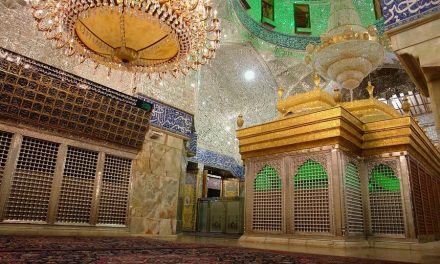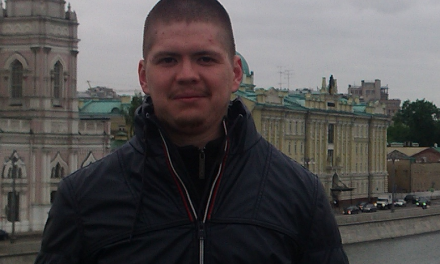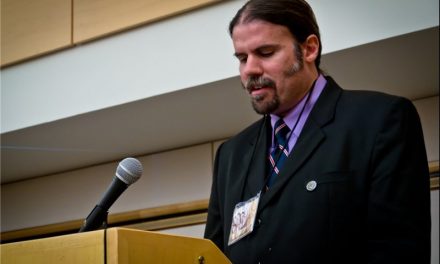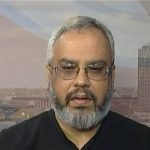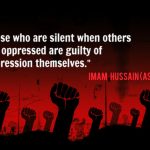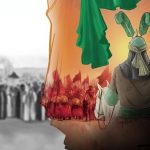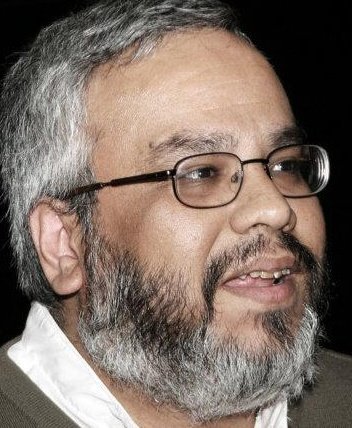
“In Islam, there is no concept of ‘collateral damage’ as per the U.S.-Zionist doctrine of war, and all efforts must be taken, including the cancelling of operations where there is a risk of civilian casualties,” an Islamic Scholar said.
“We can see our brethren in Yemen adhere to this as when they target the Arab Zionists (also known as the Saudi Family), they only target military targets,” Shabbir Hassanally told Shia Followers in an interview.
He added, “On the opposing side, however, we can see how the Zionists – both Arab and European – explicitly target civilians and unarmed protesters.”
Following is the full transcript of the interview:
The word “Jihad” has been the subject of extensive discussions in the world. First of all, what does this word mean?
Shabbir Hassanally: In the Arabic Language, the word Jihad, derives from the root verb “جهد” (jahada), which means to strive, exert effort. The construct “جهاد” (jihaad), is a verbal noun form of the verb “جهد” (jahada), as such grammatically while the English language has adopted the word, its actual meaning is closer to an act of striving. Given its Islamic bearing, the word “جهاد” (jihaad) means to strive in the way of God (i.e. for Truth, Justice, etc.)
In Islamic traditions, we have many traditions that further elaborate on the meaning of the word “جهاد” (jihaad), which add two qualities to the “جهاد” (jihaad), that of “الأصغر” (the lesser/smaller) and “الأكبر” (the greater/bigger).
Would you please further elaborate on these two kinds of Jihad? And what is the relationship between Jihad and “holy war”?
Shabbir Hassanally: The meaning of “جهاد” (jihaad) in these contexts; and from an Islamic perspective is not that of “holy war” as is defined by western dictionaries and orientalists, rather it is to struggle to establish and promote the Truth and Justice and such.
The lesser struggle; or the smaller struggle – “جهاد الأصغر ” – is defined by the Prophet Muhammad (S) as being a struggle physically against an aggressor; such as the struggle of the heroic people of Palestine and Yemen against the European and Arabic Zionists who seek to harm and destroy them.
The greater struggle; or the bigger struggle – “جهاد الأكبر” – is defined by the Prophet Muhammad (S) as being the struggle against the self, against base desires and instincts. A struggle where we work against the base animal instincts that seek to harm and damage ourselves, that put us in a situation where we may harm society and others; but primarily, that struggle that takes us away from the divine.
The reality is that the lesser struggle – “جهاد الأصغر” – is when compared to the greater struggle – “جهاد الأكبر” – much easier, because your struggle is very clear. It is against a terrorist, a despot, a tyrant, one who seeks to harm the masses – your position is very clear. Whereas the greater struggle – that which is against yourself is significantly harder, and while granted you may not lose your temporal life in the greater struggle, there is a much higher likelihood of destroying your eternal soul, and being from those who are cursed by God.
To put it very simply, and contrary to the opinions touted by the mainstream media and the orientalists and Zionists who seek to corrupt and deform the meaning of Islam; the concept of Jihad is the struggle to establish justice, both in the world at large but more importantly within yourself.
Within Islamic concepts, the idea of Jihad is a key component of the practical rules of Islam, no less important than prayers and fasting – for example. The reason for this; is that if one examines the idea of praying and fasting – they are acts that move us towards attempting to do Justice for the bounties that God has provided for us; but these activities, praying, fasting, etc. all take effort; and this effort is jihad.
By the same token, if a person is oppressed, as our brethren in Palestine or Yemen are, for example, struggle is incumbent upon both them and us; not only to ensure they discharge their duties to their Creator; but also so that they stand against the tyrants and work to establish justice in the land. If this sadly requires war and violent confrontation, then that is on account of the excesses of the aggressor – i.e. the Zionists, Arab or European – and as a means of defense.
Jihad doesn’t have to be a violent confrontation of an aggressive despot, but if needs must, then it can be, but the one making the struggle, must always understand that the struggle must always be for the most sublime of motivations; that is to establish Justice, and should not morph into violence for revenge and as is the case in the Western psyche, just for “fun”.
There is a key difference between resistance against injustice, which can be defined as jihad (though the lesser struggle as explained above) and the behavior of the Zionist storm-trooper who targets a pregnant lady in Gaza, and says “I kill two with one shot” (meaning the mother and the child in the womb). Confront and resisting such terrorists is definitely within the realms of Jihad and struggle – but as I’ve said – it still falls into the lesser struggle; and alongside it there must be the greater struggle that will prevent the struggler – the mujahed – from becoming worse than the aggressor by adopting qualities that the aggressor has.
This essentially defines the meaning of the word Jihad; and we as Muslims, who know and understand Islam and the Arabic language; do not take our meanings and translations from those who have historically been known to corrupt languages to further their own agenda and further demonize Islam and further the Islamophobic Zionist agendas.
In what ways Jihad and war are different?
Shabbir Hassanally: As my answer to the previous question covered; the differentiation between Jihad and war is vast. While as I’ve explained jihad might in certain circumstances require the confrontation of a violent despotic entity, this is but the lesser struggle and is not the whole.
It would be more accurate for the mainstream media to suggest that Jihad can incorporate war in certain, exceptional circumstances – such as the Sacred Defense (Iran-Iraq war) between 1980 and 1988 when Mr. Tikriti at the behest and with the funding of the U.S. and its allies attacked the Islamic Republic of Iran with a view to destroying it, and within this, yes, the people of Iran had a duty to resist this aggression against it – the same way that the person who has his home invaded by a thief has the duty to resist the thief with the use of violence if required – this is the same as the right of self-defence which is enshrined into the UN charter – Chapter 7 – that the world claims it adheres to.
In the same way, that the people of Palestine and Lebanon, Syria and Yemen have every right and indeed have a duty to stand against the Zionist attacks on them; and to make a glorious resistance, and if that requires the use of violence – then so be it.
However, and this is very important, the rules and conditions that must be adhered to in a war from the Islamic perspective are profound and extensive, and far too verbose to go into here, suffice it to say that only military targets can be attacked and that civilians and innocents, as well as the land and its plants, must not be damaged. In Islam, there is no concept of “collateral damage” as per the U.S.-Zionist doctrine of war, and all efforts must be taken, including the cancelling of operations (as anyone who has studied the history of the Islamic Resistance in Lebanon knows) where there is a risk of civilian casualties.
We can see our brethren in Yemen adhere to this as when they target the Arab Zionists (also known as the Saudi Family), they only target military targets – airbases, military bases, oil company (owned by the family and stealing the resources of the people of occupied Arabia).
Had this not been the case, we would have seen the skyscrapers in the UAE be demolished by the barrage of missiles sent by the heroic Yemeni resistance; but they will not target places where the risk of civilian casualties is high.
On the opposing side, however, we can see how the Zionists – both Arab and European – explicitly target civilians and unarmed protesters. In Yemen and Lebanon we saw the destruction of civilian infrastructure; the bombing of schools and hospitals, even funerals and weddings. The policy of targeting unarmed Palestinian protesters, including journalists in recent days by the Zionist occupying Palestine.
Within Islam, the idea of Jihad is to struggle; and due to the idea of the lesser and greater struggle that I’ve explained above, there is a struggle within the heart of the mujahedeen – both the soldier and the general – to ensure that civilians are not harmed.
I remember one brother from the Islamic Resistance in Lebanon told me, that prior to 2000 and the first liberation of Lebanon from Zionist occupation, there were operations to target the occupying soldiers as well as their proxy (the SLA). In one such operation, there was a high-value target, one of the leaders of the Zionist establishment would be on tour in that area surveying the occupation. It was decided by the Islamic Resistance to target this individual. However, when the attack became closer, it was determined that there were journalists who had accompanied him, as a result, the targeting of the Zionist official would have resulted in the high possibility of a civilian casualty. The operation was cancelled.
This is the perfect synergy and working together of both aspects of Jihad, the greater which controls and keeps in check the lesser, so that the ultimate goal which is to become closer to God, and to establish Justice is not compromised.
You mentioned the role of mainstream media. How does the media, especially in the West, shape people’s perception of Jihad?
Shabbir Hassanally: Unfortunately, the mainstream media doesn’t even begin to scratch the surface when it comes to this, and on the note of the media; we are – in the West at least – told that the first casualty of a war is the Truth. This is against the principles of Islam. In an Islamic Resistance – be it the eight-year war that Iran had to struggle through, the Islamic Resistance in Lebanon, the Islamic Resistance in Yemen and so on; the key component, and amongst the reasons why Hezbollah began to record many of its operations, was that they wanted to ensure that the Truth was being broadcast to the people, so people could understand what is happening properly. The Zionists’ lies were eroded.
In Yemen and Palestine, had there not been any media resistance, you would have found that the false narrative portrayed by the mainstream media would have been accepted by the Truth; whereas due to the heroes of the media resistance – the media jihaad if you like – which is no less than the jihaad with weapons, for the weapons of this jihad is the keyboard and mouse.
Such media resistance explains the famous sayings that we have such as the ink of a scholar is mightier than the sword. For the ink, when used to give people the Truth and further the cause of Justice, this is the most powerful of weapons; and another reason why the Zionists explicitly target journalists; as they don’t want the Truth to be upheld, for the Truth is something that will blind the Zionists and oppressors.
Shabbir Hassanally is a software engineer, and an Islamic Scholar, having studied in the Islamic Seminary of Qum. He contributes to various outlets as a political analyst.

